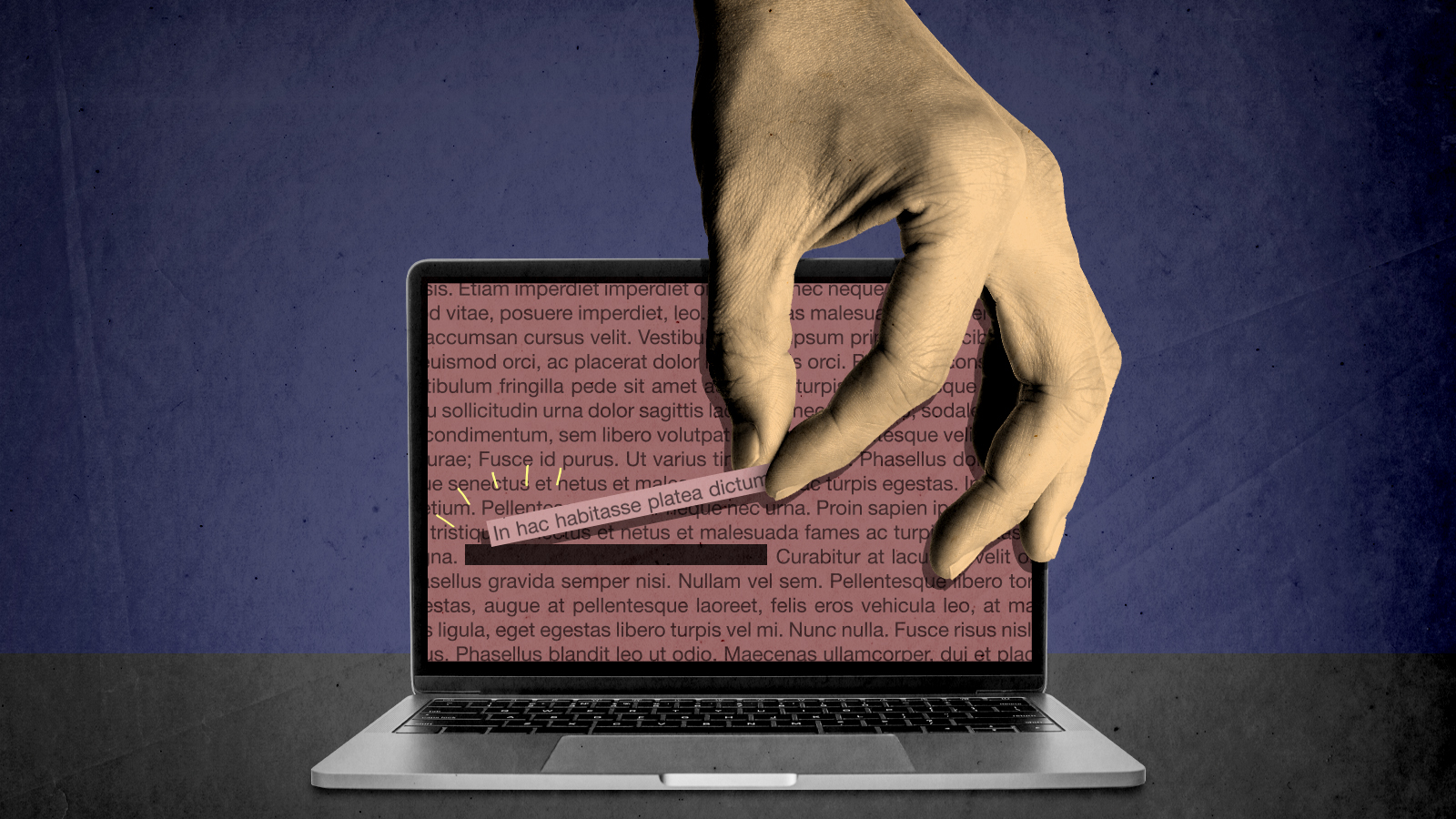The baffling persistence of plagiarism in the internet era


A free daily email with the biggest news stories of the day – and the best features from TheWeek.com
You are now subscribed
Your newsletter sign-up was successful
Shortly after the Southern Baptist Convention's prickly gathering in Nashville last month, a video circulated on Twitter showing the SBC's newly elected president, Alabama pastor Ed Litton, giving a sermon with striking similarities to a sermon previously delivered by the denomination's prior president, North Carolina pastor J.D. Greear.
Litton's critics quickly alleged plagiarism, dubbing the controversy "sermongate." In the days since, more videos have appeared with close turns of phrase. Statements from Litton and Greear agreed that the initial clip showed Litton borrowing content with Greear's private permission — but Litton's "church removed sermons from 2017 through 2019 from its website and YouTube," New York Times religion journalist Ruth Graham reports, "attributing the deletions to both a website redesign and a response to people 'going through sermons in an attempt to discredit and malign our pastor.'" That explanation seems suspect at best.
Whether the plagiarism label is fair here I'm not sure, and Graham captures well both the difficulty of crafting a good sermon every week and the range of pastoral opinion on how much content can be ethically borrowed. But what strikes me as unambiguously bad — and downright stupid — is the failure to give credit to the source.
The Week
Escape your echo chamber. Get the facts behind the news, plus analysis from multiple perspectives.

Sign up for The Week's Free Newsletters
From our morning news briefing to a weekly Good News Newsletter, get the best of The Week delivered directly to your inbox.
From our morning news briefing to a weekly Good News Newsletter, get the best of The Week delivered directly to your inbox.
Unsourced content use is hardly a problem unique to Baptist pastors. Politicians plagiarize plenty. Prominent political plagiarists include President Biden, former President Barack Obama, former first lady Melania Trump, the late Sen. John McCain (R-Ariz.), Sen. Rand Paul (R-Ky.), and many more. I should hasten to add that we often can't know if politicians who plagiarize do so wittingly. Sometimes the real plagiarist is the staffer(s) who wrote the speech — an often stranger situation, as the staffer is likely to be younger and more internet savvy than her boss and therefore (theoretically) more aware of how search engines and online opposition research work.
That public — and particularly political — plagiarism still happens in the internet era might be the definitive answer to "stupid or evil?" It is stupid, and bizarrely so, for anyone who has used the internet to imagine he can plagiarize and not get caught. Google exists. How does any would-be plagiarist not understand this in the Year of Our Lord 2021? Discovery is an inevitability.
A free daily email with the biggest news stories of the day – and the best features from TheWeek.com
Bonnie Kristian was a deputy editor and acting editor-in-chief of TheWeek.com. She is a columnist at Christianity Today and author of Untrustworthy: The Knowledge Crisis Breaking Our Brains, Polluting Our Politics, and Corrupting Christian Community (forthcoming 2022) and A Flexible Faith: Rethinking What It Means to Follow Jesus Today (2018). Her writing has also appeared at Time Magazine, CNN, USA Today, Newsweek, the Los Angeles Times, and The American Conservative, among other outlets.
-
 Quiz of The Week: 14 – 20 February
Quiz of The Week: 14 – 20 FebruaryQuiz Have you been paying attention to The Week’s news?
-
 The Week Unwrapped: Do the Freemasons have too much sway in the police force?
The Week Unwrapped: Do the Freemasons have too much sway in the police force?Podcast Plus, what does the growing popularity of prediction markets mean for the future? And why are UK film and TV workers struggling?
-
 Properties of the week: pretty thatched cottages
Properties of the week: pretty thatched cottagesThe Week Recommends Featuring homes in West Sussex, Dorset and Suffolk
-
 Big-time money squabbles: the conflict over California’s proposed billionaire tax
Big-time money squabbles: the conflict over California’s proposed billionaire taxTalking Points Californians worth more than $1.1 billion would pay a one-time 5% tax
-
 Did Alex Pretti’s killing open a GOP rift on guns?
Did Alex Pretti’s killing open a GOP rift on guns?Talking Points Second Amendment groups push back on the White House narrative
-
 Washington grapples with ICE’s growing footprint — and future
Washington grapples with ICE’s growing footprint — and futureTALKING POINTS The deadly provocations of federal officers in Minnesota have put ICE back in the national spotlight
-
 Trump’s Greenland ambitions push NATO to the edge
Trump’s Greenland ambitions push NATO to the edgeTalking Points The military alliance is facing its worst-ever crisis
-
 Why is Trump threatening defense firms?
Why is Trump threatening defense firms?Talking Points CEO pay and stock buybacks will be restricted
-
 The billionaires’ wealth tax: a catastrophe for California?
The billionaires’ wealth tax: a catastrophe for California?Talking Point Peter Thiel and Larry Page preparing to change state residency
-
 Trump considers giving Ukraine a security guarantee
Trump considers giving Ukraine a security guaranteeTalking Points Zelenskyy says it is a requirement for peace. Will Putin go along?
-
 Bari Weiss’ ‘60 Minutes’ scandal is about more than one report
Bari Weiss’ ‘60 Minutes’ scandal is about more than one reportIN THE SPOTLIGHT By blocking an approved segment on a controversial prison holding US deportees in El Salvador, the editor-in-chief of CBS News has become the main story
